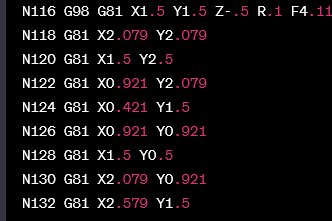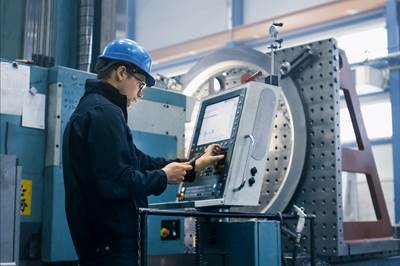CNC & Machine Controls
The CNC (computer numerical control) system of a machine tool includes the control unit itself, as well as the motion-control system such as the servomotors, drives and axis positioning devices. These components are part of any CNC machine tool, but they might be bought separately and retrofitted later on older machines that are upgraded or refurbished. Also part of the control system are sensors that may allow the control to make certain real-time decisions during unattended or lightly attended machining processes. These can include probes for measuring the position of the part or machined features, as well as monitoring systems for detecting the presence of the tool or the force that is being exerted in the cut.






ESSENTIAL READING
VIEW ALL2 Secondary Coordinate Systems You Should Know
Coordinate systems tell a CNC machine where to position the cutting tool during the program’s execution for any purpose that requires the cutting tool to move.
Read More4 Commonly Misapplied CNC Features
Misapplication of these important CNC features will result in wasted time, wasted or duplicated effort and/or wasted material.
Read More6 Machine Shop Essentials to Stay Competitive
If you want to streamline production and be competitive in the industry, you will need far more than a standard three-axis CNC mill or two-axis CNC lathe and a few measuring tools.
Read MoreTips for Designing CNC Programs That Help Operators
The way a G-code program is formatted directly affects the productivity of the CNC people who use them. Design CNC programs that make CNC setup people and operators’ jobs easier.
Read More7 CNC Parameters You Should Know
Parameters tell the CNC every little detail about the specific machine tool being used, and how all CNC features and functions are to be utilized.
Read More5 G-Code Tips for Increasing CNC Efficiency
Optimizing G code is a low-cost way to improve CNC efficiency without sacrificing usability and safety.
Read MoreLatest CNC & Machine Controls News And Updates
Unisig Operating System Enhances Productivity for Small-Diameter Gundrilling Machines
Unisig introduces a next-generation operating system, featured on its UNE6-2i-750-CR small-diameter gundrilling machine, suitable for a range of applications, including medical part manufacturing.
Read MoreFryer Machining Centers Boost Stability, Performance
Fryer Machine Systems Inc. presents its TC Series of CNC machining centers for high-performance cutting, accuracy, reliability and ease of use.
Read MoreFANUC Details Robotic Vision, ROBODRILLS and More at IMTS 2024
FANUC’s IMTS 2024 booth includes real-time demonstrations that show the abilities of its equipment, including robots, controllers and machine tools.
Read MoreGoing Hands-On with Heidenhain and Acu-Rite Solutions
Heidenhain and Acu-Rite Solutions are offering several hands-on experiences at their booth this year, as well as internal components that reduce energy use.
Read MoreSee Automated Workpiece Measurement in Real Time
User-friendly inspection software for CNC machining centers is shown monitoring measurements between and after machining while performing SPC based on recorded measurement values.
Read MoreFastems CNC Automation Solutions Provide Process Flexibility
IMTS 2024: Fastems is featuring its automated manufacturing system portfolio. It is also demonstrating its CNC automation systems and customer case studies.
Read MoreFeatured Posts
4 Commonly Misapplied CNC Features
Misapplication of these important CNC features will result in wasted time, wasted or duplicated effort and/or wasted material.
Read MoreCan AI Replace Programmers? Writers Face a Similar Question
The answer is the same in both cases. Artificial intelligence performs sophisticated tasks, but falls short of delivering on the fullness of what the work entails.
Read MoreCombining Functions With User-Defined G & M Codes
CNC programmers gain flexibility when using custom macros to define G and M codes themselves.
Read More6 Machine Shop Essentials to Stay Competitive
If you want to streamline production and be competitive in the industry, you will need far more than a standard three-axis CNC mill or two-axis CNC lathe and a few measuring tools.
Read MoreJoint Ribbon Cutting at Fagor, Danobat Showrooms
Danobat and Fagor co-hosted an inaugural event for their co-located facilities in the Chicago area.
Read MoreTips for Designing CNC Programs That Help Operators
The way a G-code program is formatted directly affects the productivity of the CNC people who use them. Design CNC programs that make CNC setup people and operators’ jobs easier.
Read MoreFAQ: CNC & Machine Controls
What does CNC stand for?
Computer Numerical Control.
Source: CNC Intro-The Key Concepts Of Computer Numerical Control
What is CNC?
Computer numerical control (CNC) is the control of machining tools through automation or computer programming. A CNC machine follows coded instructions such as G-code and M-code. These instructions are typically written by a person or by CAD/CAM software. This allows for a highly automated process that can be more efficient than manual machining, providing users with better productivity, speed and accuracy. The most basic function of any CNC machine is automatic, precise, and consistent motion control. All forms of CNC equipment have two or more directions of motion, called axes. These axes can be precisely and automatically positioned along their lengths of travel. The two most common axis types are linear (driven along a straight path) and rotary (driven along a circular path).
How much does a CNC machinist make?
According to the Bureau of Labor Statistics (BLS), the mean annual wage of a CNC tool operator is $44,300 as of May 2020. The median wage is $42,260.
Further reading: New Apprenticeship Program At Hurco North America
5 Ways to Simplify Tasks for CNC Newcomers
Physics-Based Online Training in CNC Machining Available for Free Through DoD Initiative
What should new CNC machinists know?
1. Shop safety
First and foremost, newcomers to manufacturing must understand that the shop floor is a dangerous place. You must convey general concerns in two areas: safety equipment that workers use and safety practices to which they must adhere.
2. Shop math
The arithmetic that a typical CNC operator must be able to perform is simple. However, you must ensure that newcomers can use a calculator to add, subtract, multiply and divide.
3. Blueprint reading
Anyone working with CNC machines must be able to interpret a 3D workpiece from a series of 2D views on an engineering drawing. This involves understanding line types (visible, hidden, center, section, etc.) and orthographic projection.
4. Tolerance interpretation
Newcomers must understand that every workpiece attribute has an amount of allowable error, whether it be specified or implied.
5. Measuring devices
Explain the two basic types: fixed and variable gages. Go into detail for any fixed gages your CNC operators use, including go/no-go gages and gages that incorporate a dial indicator.
CNC & Machine Controls Supplier Categories
- CNC Software, Stand-alone
- Programmable Logic Controls (PLC)
- Communications Networks & Data Transmission Equipment
- Identification Systems
- Direct or Distributive Numerical Control (DNC) Systems
- CNC Units
- Digital Readout (DRO) Units
- Digitizing/Scanning Systems
- Memory Units
- Robot Controllers
- Machine Monitoring
- CAD/CAM Software














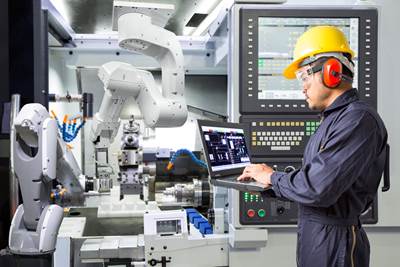
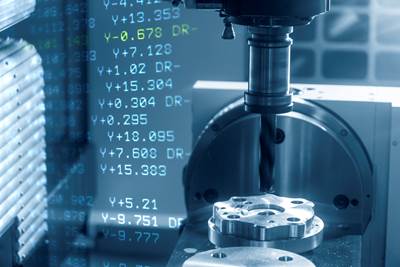
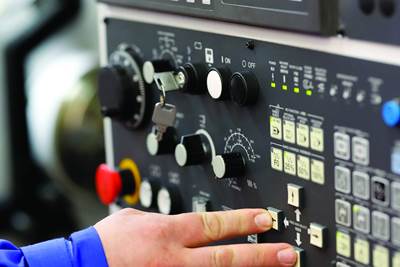
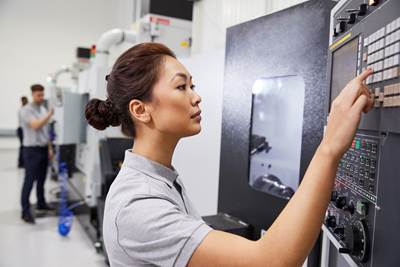


.jpg;maxWidth=300;quality=90)













